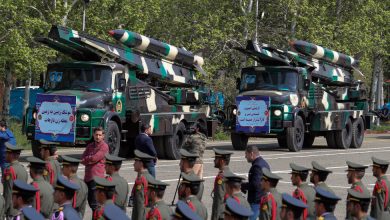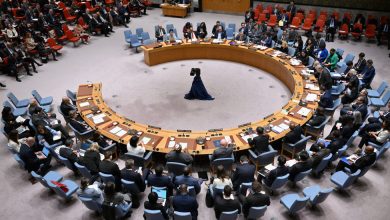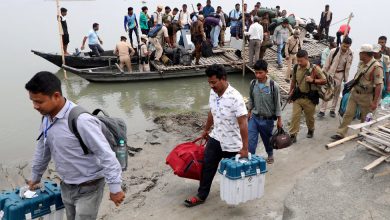Why a Sea Dispute Has Somalia and Kenya on Edge

NAIROBI, Kenya — The United Nations’ top court largely sided with Somalia over Kenya in a dispute over how to demarcate a disputed area in the Indian Ocean thought to be rich in oil and gas, a major decision that could escalate tensions in the region and ultimately reshape the two countries’ maritime borders.
The judgment by the International Court of Justice in The Hague capped a yearslong, oft-delayed case that has strained relations between the neighboring countries in the strategically vital Horn of Africa. While the court handed most of the disputed territory to Somalia, it also shifted part of the border north by a bit, in line with Kenya’s demand.
Even before the court issued a ruling, Kenya withdrew from the case, saying it would not recognize any judgment. The court’s rulings are binding but unenforceable, and many other countries have chosen to ignore them.
But this dispute, experts say, threatens to inject another note of uncertainty in a region already hobbled by terrorism, internal conflict and widespread instability.
Here’s a look at why the Somalia-Kenya feud matters, and what its political, security and economic consequences might be for the broader region.
Why is this patch of ocean so important to Somalia and Kenya?
In two words: natural resources. The disputed offshore area, which covers about 62,000 square miles, is thought to have vast deposits of oil and gas that could offer a big boost to the economy of whichever country controls it.
The area is also rich in fish, and a shift in the maritime borders could mean the loss of livelihoods for some fishing communities particularly those in Lamu County, on the northern coast, said Meron Elias, a Horn of Africa researcher with the International Crisis Group. At least two fishing landing sites exist within the disputed area and Kenyan fishermen there have repeatedly protested and called on regional bodies to intervene.
Lamu County is also a popular tourist destination and is home to an American military base, as well as a new, Chinese-built deepwater port that aims to connect East Africa’s landlocked economies, such as those of Ethiopia and South Sudan, to global trade routes.
The disagreement over the relatively narrow triangle in the Indian Ocean reflects the uneasiness that has defined the two countries’ relationship since independence. For Kenyans, the Somali claims are part of what they call their neighbor’s “resurgent expansionist agenda,” a reference to a secessionist conflict from the 1960s by ethnic Somalis in Kenya who populate the northeastern districts along the border with Somalia.
The dispute has served as political fodder for leaders in both countries.
For Somalia, which has entered a heated election period, the international court’s ruling may offer a political boost for President Mohamed Abdullahi Mohamed, who is seeking a second term in office and has stoked nationalist sentiment over the maritime dispute.
Kenya, which has deployed troops in Somalia as part of the African Union peacekeeping forces, often complains that its contributions to stabilizing its neighbor — by thwarting the threat of Al Shabab, a branch of Al Qaeda, and by hosting Somali refugees — go unappreciated.
Why can’t both countries agree on who controls the area?
The main source of contention for both Kenya and Somalia has been how the maritime border should extend from the land border.
Somalia wanted its sea territory demarcated by a line that runs southeast of its land border, and the court mostly granted that. Kenya wanted that line to run east in a straight line parallel to the Equator.
For years, the two countries tried to settle the issue through diplomatic negotiations. When that failed, Somalia, in August 2014, filed a case with the U.N. court to determine the maritime boundary.
In 2017, the court rejected Kenya’s argument that it lacked jurisdiction, but it took four more years for it to begin hearings on the case.
In March, just before the first public hearings were to begin, Kenya withdrew from the proceedings, saying its legal team hadn’t been given enough time to prepare. It also objected to the presence on the legal panel of a judge, Abdulqawi Yusuf, a Somali citizen who had served as the court’s president until February.
Is the court’s ruling final, and enforceable?
Article 94 of the U.N. charter states that member states should comply with the court’s decisions, and that any party should seek recourse from the Security Council if the other party fails to perform its obligations.
In this case, the court rejected Kenya’s argument that it had an existing boundary agreement with Somalia and that adjusting the maritime boundary would constitute a serious security concern or endanger the livelihoods of fishing communities. But the court also rejected Somalia’s claims that Kenya was violating international law and turned down its request for compensation.
While the court’s rulings are final and without appeal, it has no way of enforcing them. Last week, Kenya said it would not be bound by a ruling, following the path of other countries, among them the United States and China, that have ignored decisions from the court.
While the situation may remain tense, it is unlikely to escalate into a full conflict, said Timothy Walker, the maritime project leader at the Institute for Security Studies in South Africa.
With a weak federal government and a nascent maritime authority, “Somalia is not yet a country that can necessarily enforce its laws or international laws at sea,” Mr. Walker said.
Where do the two countries go from here?
The court ruling adds to a long list of challenges already testing relations between Kenya and Somalia.
Last December, Mogadishu severed diplomatic ties with Nairobi after accusing it of meddling in its internal affairs, only to restore them in May.
For its part, Kenya has deported Somali legislators and, at one point, suspended direct flights from Somalia to Nairobi.
Somalia also ended visas on arrival for Kenyan citizens and banned the importation of Kenyan khat, a mild stimulant leaf that brings millions of dollars into Kenya’s economy.
To ease future tensions, experts say the two countries could turn to the African Union or other regional bodies to try to chart a way forward, said Abdimalik Abdullahi, an independent researcher in Mogadishu.
“This can be done,” he said, “through establishing technical committees that could iron out other outstanding issues, the leaders maintaining contact and channels of communications, and avoiding any unilateral military activities in those waters.”




